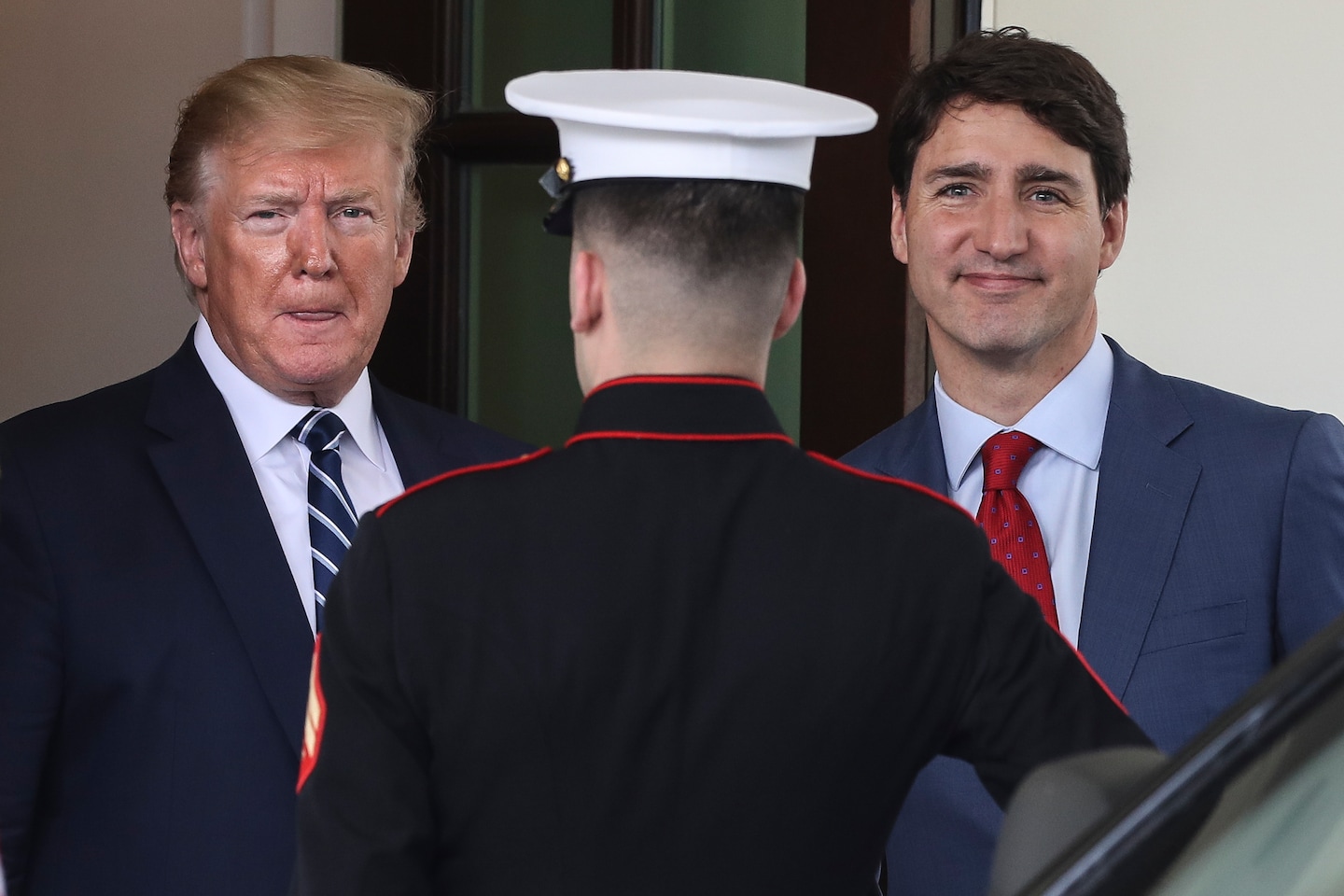Canada condemns ‘entirely unacceptable’ U.S. tariffs, pledges to retaliate with levies on $2.7 billion of goods

“Canada will respond swiftly and strongly in defense of our workers,” Freeland said. “We will impose dollar-for-dollar countermeasures in a balanced and perfectly reciprocal retaliation. We will not escalate and we will not back down.”
The move comes after Trump announced Thursday that he was using a national security provision to impose tariffs of 10 percent on some Canadian aluminum products and accused Canada of “taking advantage of us, as usual,” reigniting a trade dispute between long-standing allies just weeks after a new North American trade pact went into effect.
Freeland disputed the notion that Canada’s aluminum industry — the world’s fourth-largest producer of the metal — poses a national security threat to the United States, calling it “ludicrous.” She said the tariffs would be most harmful to American consumers.
“At a time when we are fighting a global pandemic, working on both sides of the Canada-U.S. border to prevent the loss of life and preserve jobs, a trade dispute is the last thing anyone needs,” she said.
Trump’s reimposition of tariffs doesn’t violate the new trade deal — known as the United States-Mexico-Canada Agreement — because the ability to impose tariffs is covered in a side deal.
The United States imports two types of primary aluminum, alloyed and non-alloyed, from Canada. In its proclamation announcing the tariff, it said imports of the non-alloyed variety had jumped 87 percent from June 2019 to May 2020 when compared with the previous 12-month period.
But the U.S. Aluminum Association, an industry group, said that any increase in imports of non-alloyed aluminum in the first half of 2020 has been offset by a decline in imports of alloyed aluminum, and that overall, imports of primary aluminum from Canada are “near traditional levels.”
Tom Dobbins, the group’s president, said in a statement Thursday that the U.S. government had “cherry-picked government data and omitted important context.”
The U.S. tariffs take effect Aug. 16. Canada’s countermeasures will be implemented by Sept. 16 and remain in place until the United States removes its tariffs, according to the country’s finance department. Canada’s list of potential targets includes refrigerators, washing machines, bicycles and golf clubs.
This marks the second time in as many years that ties between the two neighbors have been strained by a trade conflict.
The United States originally imposed tariffs on Canadian steel and aluminum in 2018, prompting Canada to respond with retaliatory tariffs on more than $12 billion of American goods, including playing cards, ketchup and inflatable boats. Analysts said the list was in part drawn up to exert political pressure on lawmakers in electoral districts critical to Trump’s political fortunes.
Canada and the United States settled that dispute in a side deal announced in May 2019, helping to secure congressional approval for the USMCA, which was ratified by the Senate in January and went into effect July 1.
In the 2019 side deal, the United States agreed to lift its tariffs and Canada agreed to lift its retaliatory tariffs. The document said that the United States would have the right to reimpose the duties if imports of Canadian aluminum were to “surge meaningfully beyond historic volumes of trade over a period of time.” Canada could “retaliate only in the affected sector.”
The Trump administration has considered reimposing the tariffs since at least June, arguing that an increase in imports of the Canadian metal was hurting the U.S. aluminum sector.
Chad Bown, a trade expert with the Peterson Institute for International Economics in Washington, said that the language is vague enough to leave the matter open to dispute.
“ ‘Surged meaningfully above historic levels’ — how do they define that?” Bown asked. “This is where the lawyers come in.”
Even if Trump’s move does not violate the USMCA, it damages the United States’ ability to negotiate trade agreements with other nations, Bown said.
“What this does do is give pause to other countries that might be thinking about negotiating a deal,” Bown said. “When you do, you realize no deal is ever final with President Trump.”
The aluminum sectors in the United States and Canada are highly integrated, Bown said. Canada is a large producer of primary aluminum, which the United States imports to make more-refined goods such as rolled aluminum or foil, he said.
The Aluminum Association slammed the tariffs, saying that punishing Canada does not deal with the sector’s biggest problem: China. It said China has for years flooded global markets with large quantities of refined aluminum, helping depress prices. The United States has retaliated by imposing anti-dumping duties on some imports of Chinese aluminum, but Chinese deliveries to the rest of the world are still hurting global prices, the group said.
Carla Hills, who served as U.S. trade representative under President George H.W. Bush, said the timing of the U.S. tariffs, just after a trade deal came into force, was hard to understand.
“It’s only a short period of time since we’ve entered into USMCA, and Canada and Mexico are two of our closest allies,” she said.
Canadian lawmakers of all political stripes also panned the move and urged retaliation.
Ontario Premier Doug Ford raised the specter of more trouble on the horizon, telling reporters he had heard that the United States was also considering tariffs on 40 categories of Canadian steel. He railed against Trump, who is deeply unpopular here, and urged Ontarians to buy Canadian-made goods.
“Who does this? In times like this, who tries to go after your closest ally, your closest trading partner, your number one customer in the entire world?” Ford said. “Who would do this?”
Freeland declined to say whether steel tariffs are coming. The U.S. trade representative’s office did not immediately respond to a request for comment.
“My policy with this U.S. administration is hope for the best, prepare for the worst,” Freeland said.
Whalen reported from Washington.






